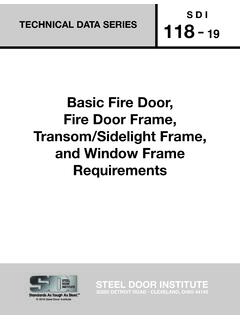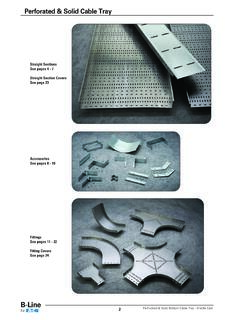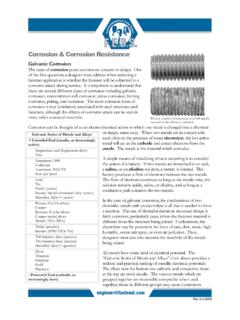Transcription of Introduction to Steel Doors and Frames - Steel Door Institute
1 Introduction to Steel Doors and FramesSteel Doors and Frames 101 Page 3 Steel 101 Quiz Page 12 Fire Door Assemblies Page 13 Fire Quiz Page 20 Specialty Steel Doors Page 21 Specialty Steel Quiz Page 31 Quiz Answers Page 32 Courtesy of the Steel Door InstituteTable of ContentsSteel Doors and Frames 1013 Steel Doors and Frames 101 IntroductionSteel is very strong, and in its unaltered state, can withstand significant natural and man-made abuse. Properly installed and maintained hollow metal Doors often last 30 years or longer. When repairs are necessary, they typically occur in the field at relatively low cost. Steel Doors have a low total cost of ownership compared to other door materials. You may hear these Doors and Frames referred to as Steel or hollow metal.
2 Generally, architects refer to them as Steel and distributors and manufacturers say hollow metal . Please note that they are referencing the same product and the terminology may be used of a Door OpeningHead (header) The horizontal member which forms the top of a frameHinge jambThe vertical frame member prepared for hinges or pivots Strike jambThe vertical frame member prepared for a strikeLightA glazed openingDoor faceThe exposed surface of the door not including the vertical edges and top and bottomLock setThe hardware and components that make up the locking or latching mechanism on a door Strike plateA metal plate affixed to a doorjamb with a hole or holes for the bolt of the door. When the door is closed, the bolt extends into the hole in the strike plate and holds the door material(s) in a hollow metal door or panelSteel Doors and Frames 1014 Fire Rated Doors and FramesFire rated Doors and Frames play a vital role in keeping people safe and minimizing property damage during a fire.
3 In fact, there has never been a loss of life from a fire in a building with properly installed and maintained fire Doors . Fire Doors must meet the requirements of the International Building and International Fire Code, as well as NFPA 80 Standard for Fire Doors and Other Opening Protectives. Fire ratings range from 20 minutes to 3 hours. Hollow metal is the only door material widely available with a 3 hour label. If the wall is fire rated, the frame and door must be fire rated as well. In the event of a fire, temperature rise Doors minimize the heat transfer to the non-fire side of the door so people can safely escape from a burning building. These Doors are built with a specifically designed core and are commonly found in the stairwells of high rise with Disabilities Act (ADA)The Americans with Disabilities Act (ADA) ensures building access to people with disabilities, of which Doors play an important role.
4 ADA requirements for Doors in places of public accommodation touch on a variety of characteristics, including: Minimum HeightOpening ForceClosing SpeedHardwareGlasslight LocationMinimum Door WidthMinimum Maneuvering ClearancesThresholdSteel Doors and Frames 1015 Types of FramesFrame profiles are generally either masonry/flush Frames or slip-on drywall Frames . The two most common types of Frames and elevations are knock down (KD) and welded. KD Frames come in pieces. The frame is then assembled and installed into an opening. Welded Frames are manufactured and delivered in one piece. They are set in place and then the masonry is built around the welded Drywall FramesAlso called KD pressure-fit or slip-on drywall Frames , these Frames are specified for installation in existing drywall openings.
5 They are shipped disassembled, use compression anchors, and have interlocking tabs and slots in the KD FramesStandard KD Frames are specified for new wall construction. They generally have slots and tabs, but use standard anchors instead of compression Welded FramesThe most common type of welded frame. The joints between the head and jamb faces have a continuous weld on the visible side of both faces only. Frames are shipped Welded FramesAlso called full profile welded or fully welded. The comer/perimeter joints have all elements of the frame member continuously welded including soffits, stops, rabbet, faces, and Doors and Frames 1016 Frame ProfileFaceExposed part of the frameThroatOpening between the backbends of the frameJamb depth Overall width of frame profile face to face dimensionStopPart of frame door the closes againstRabbet The area on either side of the soffit, available in a single or double rabbet designSoffitThe area between the rabbetsSteel Doors and Frames 1017 The Frame OpeningNominal openingThe distance measured between the frame.
6 The net opening is the measurement of the door slab. UndercutClearance between the bottom of the frame and the doorDoor width and door heightMeasurements of the width and height inside of the frame, less the clearanceAnchoringAnchors are used to affix the frame to the wall. The type of anchor depends on the wall, generally either stud or masonry. There are a variety of stud wall anchors that are specific to each wall type. They are often shipped loose with the Frames or can be welded into the jambs. Masonry wire anchors are installed in masonry Frames as the wall is built and can be resized to match the jamb depth of the frame as needed. Note - Altering anchoring methods may negate the fire rating of the Doors and Frames 1018 ElevationsThere are endless frame possibilities.
7 Sidelights are physically connected to the side of the door. Transoms are an overhead light or panel. Many Frames have more than one type of elevation. This school entrance has sidelights and transoms, plus the Doors have vision panels. Performance Levels of DoorsArchitects will stipulate the performance level in their specifications. ANSI/SDI - Specifications for Standard Steel Doors and Frames assigns door performance levels from 1-4. The gauge of Steel is thicker with each level, and the heavier duty the door, the more it costs and weighs. Level one Doors are standard duty and are designed for applications with minimal wear and tear, such as an interior office four Doors are maximum duty and are built for abusive environments or where security is SelectionThere is a Door Selector Tool on the SDI website that recommends door performance levels based on the location of the opening (ie.)
8 School gymnasium, office stairwell, etc.). Just visit and click Door Selector in the main menu. LevelThicknessManufacturers Standard GaugeInchesmm1 - Standard - Heavy - Extra Heavy - Doors and Frames 1019 Door CoresHollow metal door manufacturers use a variety of core materials to meet the desired performance levels. HoneycombModerate sound reduction, minimal insulationPolystyreneModerate insulation, minimal sound reductionPolyurethane High insulation, minimal sound reductionMineralUsed for temperature rise Doors , which reduce the heating of the cool side of the doorSteel Stiffened with Fiberglass Insulation Withstands abuse and high usage; good sound resistance These are the most common core materials, however hollow metal door manufacturers have proprietary cores as well, particularly for high performance products.
9 Galvannealed vs. galvanized SteelHollow metal Doors and Frames are generally made with galvannealed Steel , not galvanized Steel . galvanized Steel has that spangled look and is often found in coating weights of G40, G60, and we ve seen specs with up to G90. The issue with these G coatings is that primer doesn t stick very well to them so it hinders the protection of the Steel Doors . Although sometimes specified and manufactured, the Steel Door Institute does not recommend the G Type zinc coating for Doors and Steel is still zinc coated without the spangled look and is generally coated at A40 or A60. A40 is the minimum recommended weight, while A60 offers better corrosion protection. It is not recommended to go higher than A60 because it reduces paint adhesion.
10 Galvannealed Steel is also known as paintlok for its excellent paint adhesion, which is why it is by far the most common type of Steel used in hollow metal Doors and Frames . Honeycomb coreGalvannealed steelGalvanized steelHoneycomb coreSteel Doors and Frames 10110 Hardware ReinforcementYou ve probably experienced the frustration of a door that doesn t operate properly. Maybe it was sagging, or perhaps the hardware was loose and falling off. While the initial reaction may be to blame the quality of the door or hardware, the majority of these issues are due to poor installation. Despite the manufacturers not being at fault for improper field installation, their reputations are still on the Steel Door Institute created ANSI/SDI Recommended Practice for Hardware Reinforcing on Standard Steel Doors and Frames as a guide to door reinforcement and the installation of door hardware.











